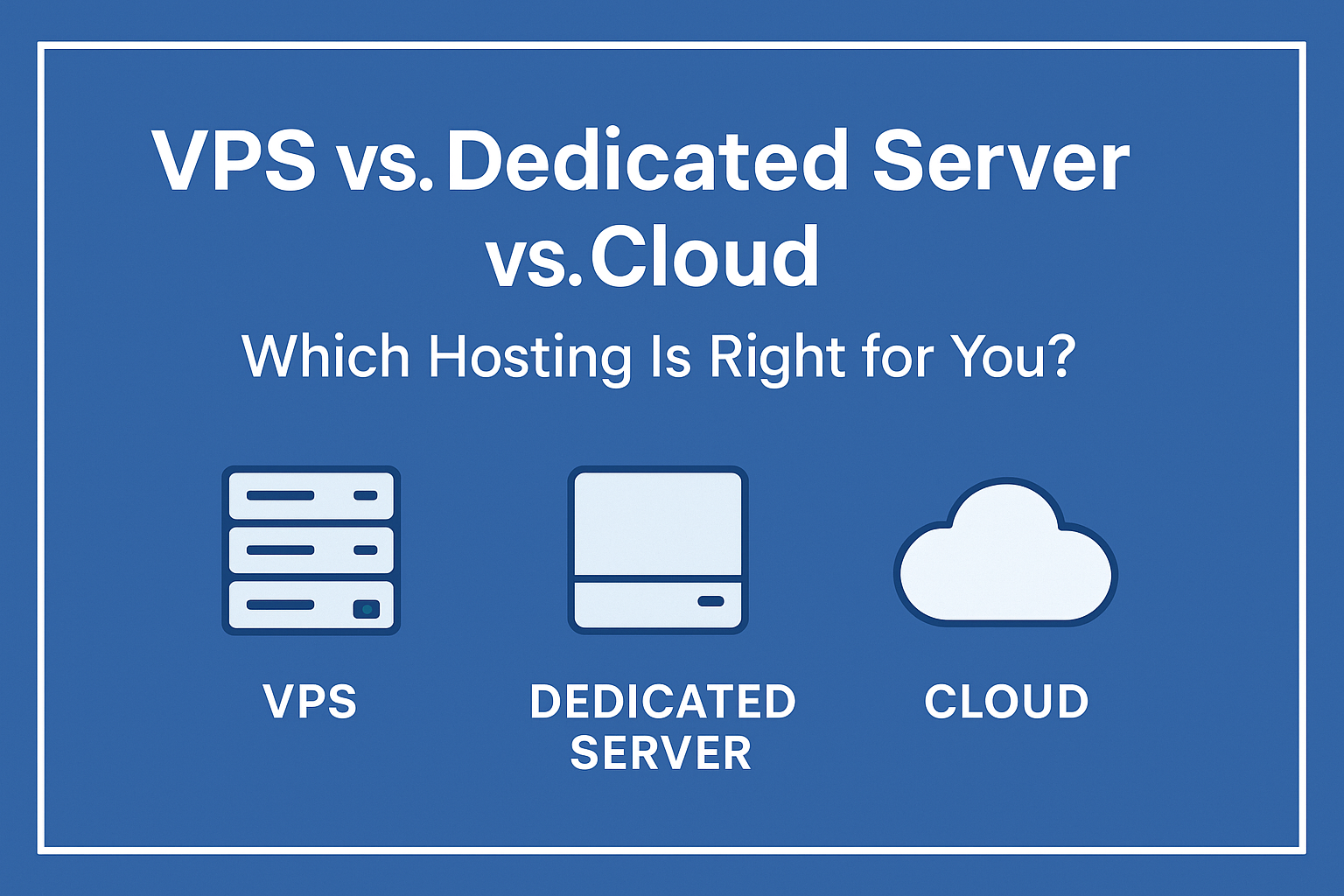VPS vs Dedicated Server vs Cloud Hosting: Which One Should You Choose?
Choosing the right hosting for your website is crucial for performance, reliability, and scalability. With multiple options available—VPS, dedicated servers, and cloud hosting—it can be confusing to decide which one suits your needs best. In this guide, we’ll break down each type of hosting, their advantages, drawbacks, and ideal use cases.
What is VPS Hosting?
VPS (Virtual Private Server) hosting is a type of hosting where a physical server is divided into multiple virtual servers. Each virtual server functions independently with its own resources such as CPU, RAM, and storage.
Advantages of VPS Hosting:
-
Affordable: VPS hosting is cheaper than dedicated servers while providing better performance than shared hosting.
-
Dedicated Resources: Unlike shared hosting, VPS ensures your site has guaranteed resources.
-
Root Access: Users can install software and configure settings as per their needs.
Drawbacks:
-
Limited resources compared to dedicated servers.
-
Performance may vary if the physical server faces high traffic from other VPS users.
Ideal for: Small to medium businesses, growing websites, and developers needing flexibility without the cost of a dedicated server.
What is Dedicated Server Hosting?
Dedicated hosting provides an entire physical server solely for your website. It offers maximum control, performance, and security.
Advantages of Dedicated Hosting:
-
High Performance: Full access to server resources ensures optimal performance.
-
Complete Control: Root access allows full customization of server settings.
-
Enhanced Security: Dedicated resources reduce risks from other users’ activities.
Drawbacks:
-
Expensive compared to VPS and cloud hosting.
-
Requires technical knowledge to manage and maintain the server.
Ideal for: Large websites, eCommerce stores with heavy traffic, and enterprises that require top-tier performance and security.
What is Cloud Hosting?
Cloud hosting uses multiple servers working together to host websites, ensuring high availability, scalability, and flexibility. Your website draws resources from a cluster of servers rather than relying on a single machine.
Advantages of Cloud Hosting:
-
Scalable: Easily adjust resources based on website traffic.
-
Reliable: High uptime because multiple servers share the load.
-
Cost-Efficient: Pay only for the resources you use.
Drawbacks:
-
May become costly for very high-traffic websites.
-
Limited control compared to dedicated servers.
Ideal for: Startups, fast-growing businesses, apps, and websites expecting fluctuating traffic patterns.
VPS vs Dedicated Server vs Cloud: Key Comparison
| Feature | VPS Hosting | Dedicated Server | Cloud Hosting |
|---|---|---|---|
| Cost | Moderate | High | Pay-as-you-go |
| Performance | Good | Excellent | Excellent, scalable |
| Control | Root access | Full control | Limited control |
| Scalability | Moderate | Low | High |
| Security | Moderate | High | High |
Which Hosting Should You Choose?
-
Choose VPS if you want a balance between cost, performance, and control.
-
Choose Dedicated Server if you need maximum performance, security, and have technical expertise.
-
Choose Cloud Hosting if you need scalability, reliability, and flexibility to handle fluctuating traffic.
By evaluating your website’s needs, expected traffic, and budget, you can make an informed decision that ensures your online presence remains fast, secure, and reliable.
Conclusion
Selecting the right hosting is critical for your website’s success. VPS offers affordable flexibility, dedicated servers provide ultimate performance, and cloud hosting ensures scalability and reliability. Understanding these differences will help you choose the hosting that aligns perfectly with your business goals.






